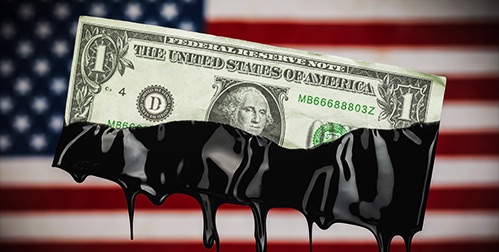Oil Prices Spike on Cut Announcement
Global oil prices spiked after a surprise announcement by OPEC+ to reduce production. The cut amounts to over 1 million barrels per day. Oil prices had been dropping for the past few months because a bleak global economic outlook threatened to reduce overall oil demand. The move has global implications for inflation, international relations, and gold prices.
The voluntary cuts from OPEC+ members will begin in May and last until the end of 2023. This move is causing a jump in global oil prices. The US benchmark, West Texas Intermediate crude, surged more than 6% to about $80.23 a barrel. Brent crude, the international benchmark, jumped 5.35% to about $83.34 a barrel.1
The impact of higher oil prices on the economy could be severe. Gas prices could lurch upwards again. In addition, higher fuel prices lead to higher prices for goods and services. Fuel costs were one of the major contributors to inflation hitting a 40 year high. The Federal Reserve is still struggling to contain lingering inflation. They’ve already raised interest rates nine times in a row. The Fed may raise them again at its next meeting in May.
The White House has condemned the move by OPEC+. The US National Security Council said that “we don’t think cuts are advisable at this moment given market uncertainty… And we’ve made that clear.”2
Despite US pressure, OPEC+ members are pursuing policies that defend their fundamental interests. The Saudis are determined to keep oil prices high enough to fund ambitious mega-projects and overhaul their economy. The move by OPEC+ reflects a new global political realignment away from the West. Observers call it a “gut punch” to US hegemony. Higher oil prices can strengthen US rivals like Russia. They would also be a major boon for China if Saudi Arabia starts trading oil in yuan.3
The Oil/Gold Correlation
Gold and oil are two of the most traded commodities in the world. They are often viewed as safe havens for investors during economic uncertainty. When oil prices rise, gold prices tend to rise as well.
Higher oil prices can lead to higher inflation and erode the value of currencies. In response, investors may turn to gold as a store of value, as it is not directly affected by inflation. This increased demand for gold can drive up its price.
Additionally, higher oil prices can lead to higher production costs for businesses. As a result, profits drop and cause investors to lose confidence in the stock market. In this case, they may turn to gold as a safe haven investment, causing its price to rise.
The OPEC+ move to raise oil prices despite US demands can have wide ranging consequences. Higher oil prices may send inflation soaring again and put the Fed’s monetary policy into disarray. They can also strengthen US adversaries like Russia and China, while weakening dollar dominance. Overall, investors can expect uncertainty to rise. To counter that uncertainty, they can look to safe haven assets like gold. Historically, gold usually rises in price alongside oil. Contact us today at 800-462-0071 to learn how a Gold IRA can protect your funds from the next energy crisis.






